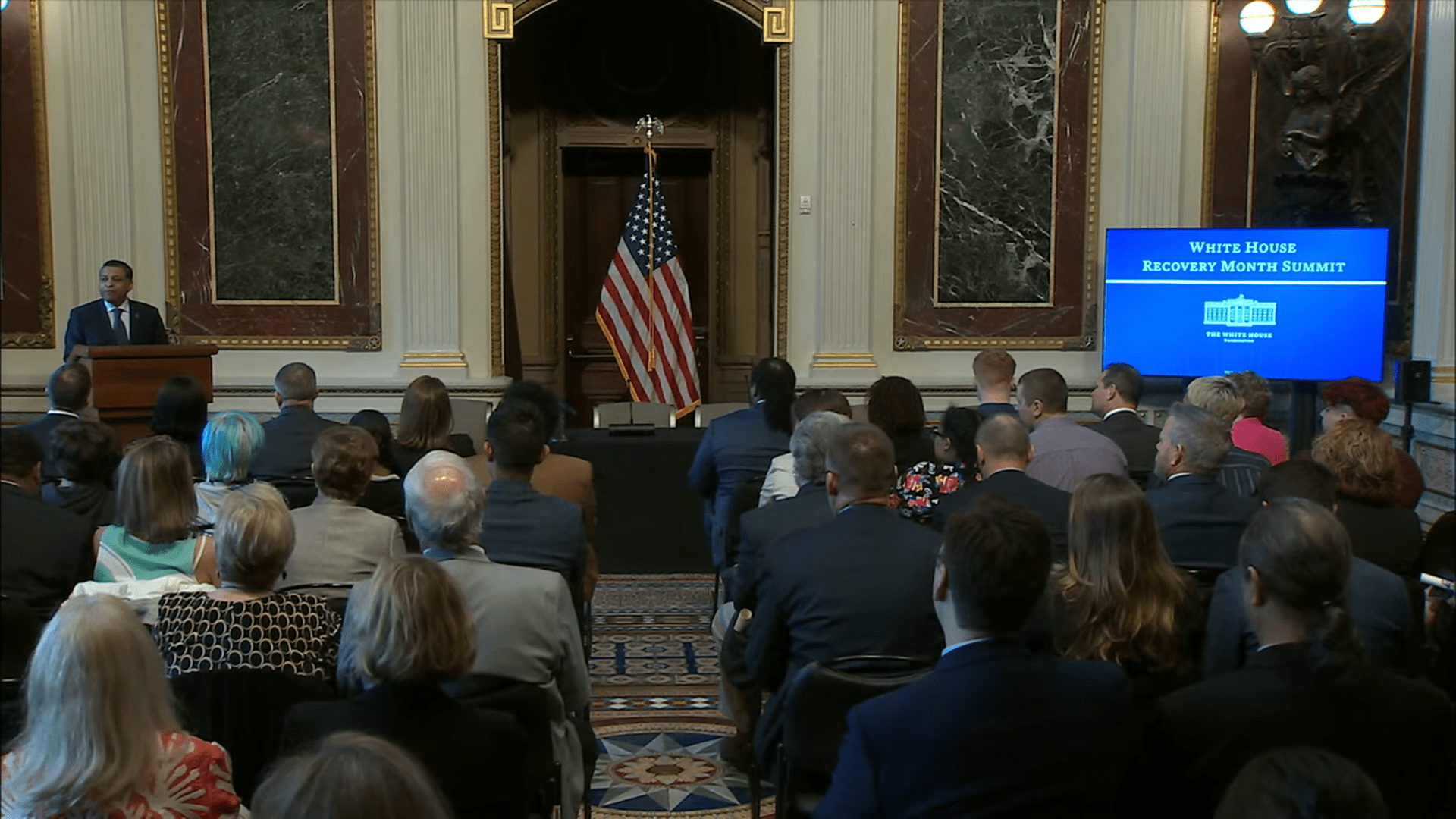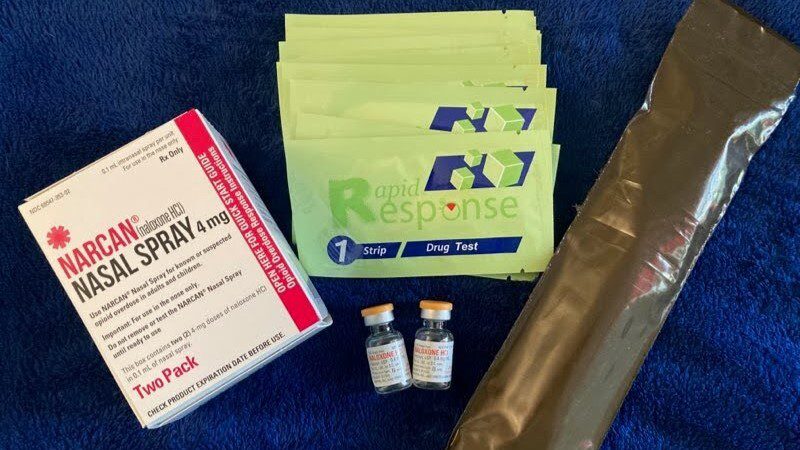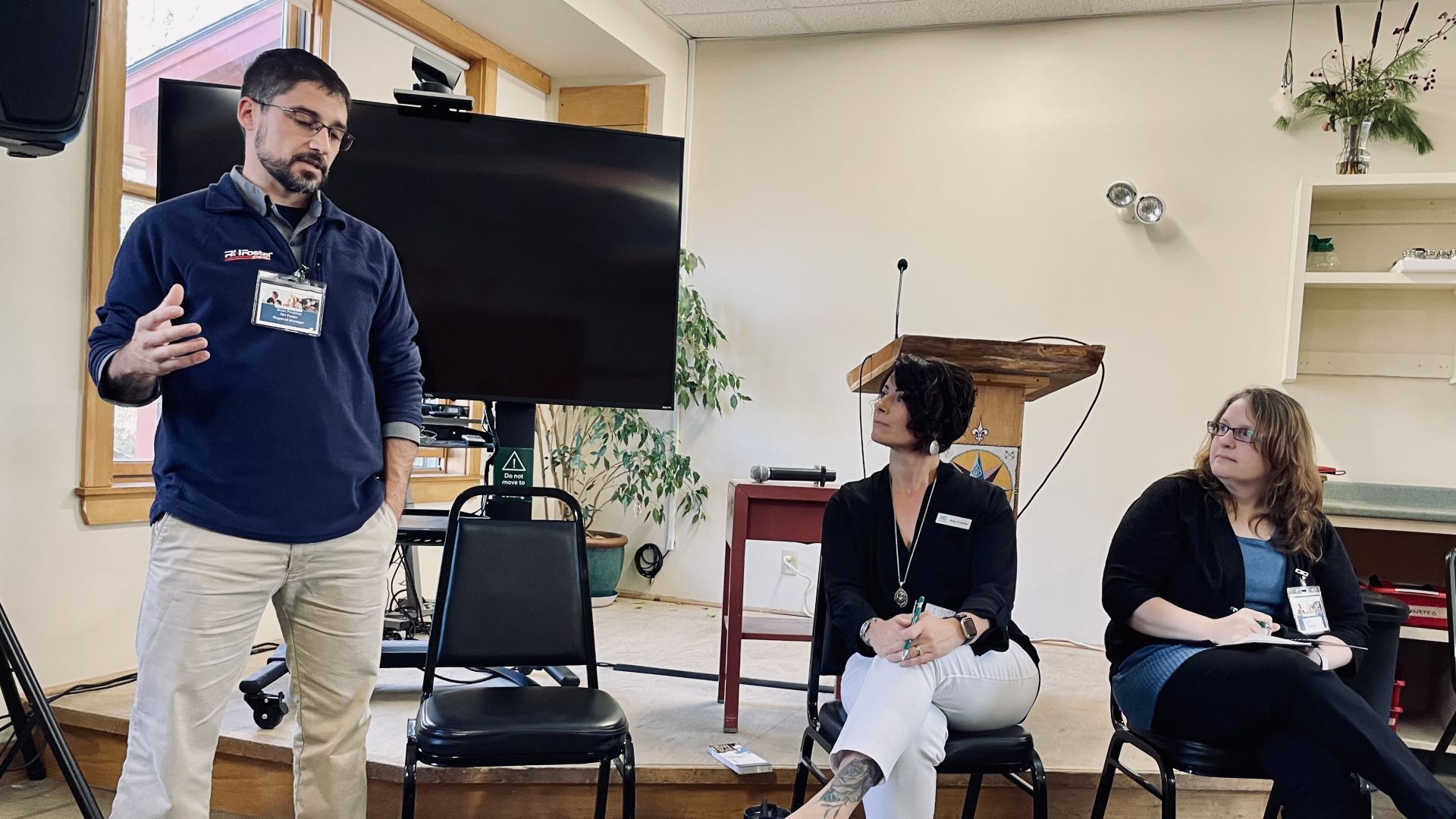Fourteen years ago, he was a homeless 21-year-old living on a park bench in Bar Harbor, addicted to drugs and estranged from his infant daughter. The picture Brian Frutchey paints of himself, speaking at the Sunrise Economic Council summit in October, is hard to imagine.
Dressed in khakis, a sweater and dress shoes, with neatly cropped hair and beard, the soft-spoken Whitneyville man looks every inch the RH Foster regional manager and community leader he’s become.
He spent six years with the wreath-making company and then was hired to manage RH Foster’s Machias gas station and convenience store. From there Frutchey built his management skills as a manager for a large landscaping company where he was able to hire people in recovery. Then, RH Foster Energy, a multi-million dollar energy company, recruited him to come back as a regional manager.
But Frutchey said it took a set of handcuffs and two felony charges to sober him up and start him on that path.
“I was looking at two to five years in prison, and recovery gave me a second chance to be a father and to be a human being, quite frankly,” Frutchey said.
His journey to sobriety began in Washington County’s drug court, with strict adherence to court monitoring, attendance at AA meetings, and a court order to get a job.
So, Frutchey went to work making wreaths, and he worked hard. In the beginning, Frutchey said, he worked 67 days straight, with no days off, and he was happy to do it. But it was only possible because his employer gave him a chance.
“I said to him, I’m doing this drug court program, and you know, I have a criminal record,” Frutchey told him. “And he just said, ‘So? Do you want to work?’”
Frutchey was so shocked he asked the employer to repeat himself, and for good reason.
Understandably, most employers are reluctant to take a risk on a criminal, much less someone who is in recovery for substance use disorder (SUD).
That reality led the Sunrise Economic Council (SCEC) and the Community Caring Collaborative (CCC), two non-profit agencies striving to bolster the health and economy of Washington County, to form a Recovery Friendly Workplace (RFW) network.
The Washington County program, launched earlier this week, is one of three recovery network “hubs” in a statewide initiative designed to create supportive workplace cultures for employees in recovery by connecting employers to supportive resources, services, and training.
The goal of the initiative is two-fold: help remove some of the barriers to employment for people in recovery; and help employers navigate the myriad resources available to support their role, including training and information about available tax credits — up to $9,600 for each new hire of someone in recovery — and other benefits to mitigate risk.
Atricia “Dodie” Emerson is the SCEC Downeast Community Catalyst and the contact for the county’s Recovery Friendly Workplace network. Before joining the program design team two years ago, Emerson spent 23 years working for the Maine Department of Labor in the Bureau of Employment Services.
“Substance use disorder is a common and costly issue in the workplace,” Emerson said. “However, helping employees in their recovery can go a long way in building and maintaining a productive workforce.”
Since it was first conceived in New Hampshire in 2017, the RFW network concept has been adopted in 35 states and one Canadian province. The newly launched program in Maine has 17 networks statewide, from Kittery to Aroostook County. They are administered jointly by the Eliot-based Pine Tree Institute and the Portland Recovery Community Center.
The eagerness of communities to sign on to the initiative isn’t just about persuading employers to give people in recovery a break, it’s about helping employers cope with the challenges connected with those who are already on the payroll, said Larry McCullough, executive director of the Pine Tree Institute.

According to the U.S. Department of Labor, 7 out of 10 people impacted by substance use disorder have full-time jobs. The agency reports that in Maine, 70 percent of workers with substance use disorder use alcohol, 48 percent use cannabis, and a staggering 50 percent are using illicit drugs weekly.
“And this is not 50 percent of the population, this is 50 percent of the people who are employed,” said McCullough. “So, businesses are dealing with this issue, whether they acknowledge it or not.”
For employers who ignore the problem or don’t know where to turn for help, not only do their unsupported employees who are struggling with drug and alcohol abuse suffer, but so does their bottom line. Sick days, workplace accidents, and working while impaired are among the costs.
A cost-benefit analysis prepared by the Substance Abuse and Mental Health Services Administration (SAMHSA) estimated that since 1999 substance use, for both drugs and alcohol, costs U.S. businesses $510.8 billion, or $21.3 billion each year. Those losses, calculated in 2008, are certainly much larger now, especially after factoring in the multiplier of the soaring epidemic.
The expense of not dealing with substance abuse in the workplace is not only staggering for businesses but also for society.
The federal drug control budget for 2022 was $39 billion, according to data from the U.S. Government Accountability Office. The costs for Maine are also daunting. The Maine Center for Economic Policy (MECEP) and the ACLU of Maine found that every year state and local governments spend $111 million prosecuting people who use drugs.
Abby Frutchey, who is the substance use response coordinator for the Community Caring Collaborative, said there are over 14,000 laws in place across our country that prohibit individuals involved in the criminal legal system from employment opportunities.
Frutchey is married to Brian Frutchey and has been in recovery herself for 19 years. She said a lot has changed since she first began the work of helping others struggling with addiction. Frutchey said businesses are now a crucial part of the equation.
“For many years I sat around tables talking about recovery, and the only people at the table were behavioral health professionals or law enforcement because it was either treat them or lock them up,” Abby Frutchey said.
Recovery professionals say that the criminal records people get from drug charges forever brands them as criminals. The stigma makes acquiring employment, housing, and certifications very difficult to get and keep.
The MECEP/ACLU reported in 2022 that the cost of incarcerating an SUD offender in state prison for one year is twice as much as it would cost to provide housing, weekly counseling, and medication-assisted treatment for a year at current MaineCare reimbursement rates.
According to one study from Maine SAMHSA and the University of Maine substance use and its related issues carry a price tag of $1.403 billion. Broken down that’s roughly $1,057 for every resident of Maine.
The 2022 overdose report from the Maine Attorney General’s office stated that the 10,110 overdoses reported in Maine last year resulted in 716 suspected or confirmed deaths. Twenty-three of those people were from Washington County. Most of the state’s overdoses were from opioid use.

Government and recovery professionals agree the numbers are grim. Still, they find hope in the 93 percent overdose survival rate, proof they say that treatment and support are working and worth the investment.
The state was awarded a $1 million federal grant for staff to design and implement the RFW initiative. The Pine Tree Institute and the Portland Recovery Community Center were tapped to administer the initiative statewide. The two-year state contract with the agencies provides up to $600,000 from the Opioid Prevention and Treatment Fund. The legislature allocated $300,000 for the first year in July.
The program is also partnering with Maine’s network of 17 recovery community centers, all of which will be active supporters of the program and assist in growing the number of employers who apply to be certified as a recovery friendly workplace, according to a statement from Tony Ronzio in the governor’s office.
In Washington County, the RFW network was developed over the last two years by a team of business leaders, human resource and public health professionals, community members in recovery, and the Maine Department of Labor, with support from the Maine Community Foundation.
“We put together a diverse design team of people who have lived experience to really help us not only design it but lead this design,” Abby Frutchey said. “We really listened to what employers needed and to what job seekers needed.”
Individual recovery networks have to secure their own funding from foundations, grants, or other means, such as local government funding. The Pine Tree Institute and Portland Recovery Community Center are also tasked with assisting the networks in identifying funding sources. The agencies are also the contact point for certification of businesses who want to join one of the state’s RFW networks, a necessary step in the process.
With the state initiative still in the nascent stage, only a couple of businesses are fully signed on, and a handful of others have formally submitted letters of interest.
Emerson, the Washington County RFW Network contact, said they are confident that as employers hear about the network’s many benefits, others will quickly come on board.
“We know that many employers are already doing the work,” said Emerson. “The RFW network will provide valuable resources and connections, so they don’t have to feel isolated or try to figure it out themselves.”







